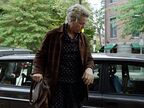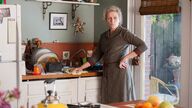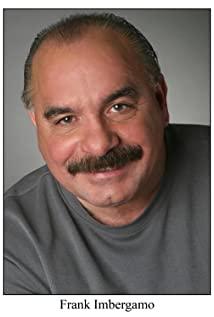The four-part American miniseries "Olive Kitteridge" (2014) has a lot to say, but what interests me the most is the characters in the show. Characteristics are worth pondering, and the reasons behind their behavior are worth scrutinizing. The audience's biggest feeling is that Olive, the protagonist of the play, behaves strangely. In fact, her "weirdness" is often related to her family, and it can even be said that it is all thanks to her family!
1. About her husband Henry
At the beginning of the first episode, Olive's husband Henry (Henry Kitteridge) gave Her Valentine's Day card, which was supposed to be a joy, turned her hand and threw it in the trash; her husband wanted to have a good chat with her, but she flatly refused. If you only look at these two details, her behavior is of course very strange, but we don't know what happened in their more than ten years of married life. It seems unfair to put the blame on Olive. However, This set the tone for the film, at least allowing Olive to give the audience a preconceived bad impression. But if we carefully analyze her husband's next behavior, it seems that we can change this stereotyped first impression that her so-called midlife crisis is largely caused by her husband.
It is implied many times in the play that Olive has fulfilled her responsibilities to the family. Because she is a teacher, her son Christopher is of course more taken care of by her, and Henry, as a father, only casually asks "How is school?" at most when he learns that his son's grades are not satisfactory. "Do you want me to help you with your homework?" My son refused. Do I need my son's consent for homework help? Apparently he didn't care enough about his son. When Henry spilled the sauce bottle while eating, Olive immediately got up to clean it up and told her husband not to move, obviously, she knew his husband was not good at such things; Liv will still do her housewife's duty to clean up her husband. That's why Olive said to her husband, "What would you do without me!"
So how did Henry perform? The first episode is devoted to his relationship with Denise, a pharmacy employee. Denise should be a very insecure young woman who lacks fatherly love. She doesn't think she deserves the happiness of the moment, a prophecy that leads God to take her husband. When she was in a state of extreme sadness, Henry took great care of her, even feeding Denise in front of Olive and her son, which seemed to have crossed the boundaries of ordinary friends, because his son was surprised Looking at all this, doesn't he know that this will cause serious dissatisfaction to his wife? Some people might say that this is the instinct of a doctor who is taking care of a patient. However, from the robbery and kidnapping scene where the two accuse each other, Henry often treats young women inappropriately, and he also knows that. The attitude of his wife, since he is so disregarding his wife's feelings, it is difficult to say how much respect he has for his wife. In fact, the relationship between Henry and Denise is indeed very ambiguous. It can be said that he has already derailed ideologically, as evidenced by his Cold War with Denise. Some people may say that he finally resisted Denny's tenderness attack on him, and also contributed to the combination of Denny's and Jerry, he did not lose Olive! It is true that he did not commit any substantive deviant behavior, but this does not mean that he is to take into account the feelings of his wife, but more to maintain his moral image in the hearts of others - a good gentleman or a perfect man.
Henry is definitely not perfect in front of his family, and his perfect image is shown to outsiders; moreover, from the perspective of the relationship between husband and wife, the reason why Olive shows strange behavior, her husband Henry has to bear a lot of responsibilities. Responsibility. Because, Olive's behavior is a bit strange, but if Henry has the behavior of defending his wife, it is absolutely impossible for him to get the title of Mr. Good! Husband and wife should be a kind of community, not only in the sharing of honor and disgrace, but also in the maintenance of each other in external interpersonal communication, even if it is a wrong behavior, it is very beneficial in maintaining a good relationship between husband and wife. Now that Henry has won the title of Mr. Good, he has not fulfilled his responsibilities in this regard. This can understand why Olive is always in a particularly bad mood, because his husband has never been on her side, and always acts according to the so-called social morality. In fact, he violates a certain morality to protect his other half. Definitely good for the building of the relationship between husband and wife, but Henry never did. To a certain extent, Olive is not ignorant of the basic moral requirements between people, she is just waiting for her husband to truly disregard her own personal morality to protect her once, but Henry is so stubborn , which caused her to always fight against the so-called morality that made the good gentleman, so that she derailed. In fact, she can easily change her negative emotions, as long as someone agrees with her. For example, she was upset that her son was not picked up at the right place, but during the conversation her son agreed with her about his ex-wife, and she was immediately happy.
Emotions can be managed, but Henry has never been willing to help Olive. As a physician, Henry should have known that his wife's volatile temperament was related to her family history of depression. Even their teenage son recognized that her meanness was due to her depression, so he simply denied the connection. Sex, it shows that he is not willing to admit that she is a potential patient, and he can improve his wife's changeable mood through a certain degree of obedience. Not only was he reluctant to help his wife with a degree of obedience, he was even reluctant to give even the compliments that were obvious. The most obvious example is at the beginning of the second episode, she found Patty (Patty) fell into the water, and beckoned Kevin (Kevin) to rescue Patty, Henry only introduced to relatives and friends that Kevin was a rescue hero, not at all. I would like to mention that saving lives also has a share of the wife's credit. Even the rescued admits that Olive is her "guardian angel". In addition to this example, there is one more example of his disrespect for his wife. When Oliver's affair partner, Casey, died in a drunken driving accident, he said to his wife, who was working in the garden, "You won't leave me, will you?" If you die, you won't go with him, will you? This sentence is very vicious, it is obviously stabbing her wound, a kind of personal insult. Although we can also interpret that he just solved Denny's problem, he didn't leave her, he just demanded equal retribution from her, but there is still a sense of moral superiority. Therefore, Olive immediately counterattacked: "God, you are so nauseous!"
Some people may say that Olive doesn't have much merit to say, how can you make her husband appreciate her? In fact, it is not true. Olive can be said to have many advantages, such as her understanding, kindness, willingness to help others, and love for children. These are all examples. When she found out that her son was unwilling to have dinner with the adults, she agreed as soon as the son asked to leave; although she objected to her husband's excessive contact with Denise, at the funeral, she was keenly concerned with Denise's feelings, and let her Husband takes Dan out of the room; when she finds out that Denise's husband, Jerry, is a jerk who pissed off her own wife when she touches a dick in someone else's place, she deliberately says "pee" to show support for Denise; she realizes that Kevin's mother may be depressed and commit suicide. She took the initiative to visit and remind Henry to pay attention to the medicine she prescribed; she saved Patty who fell into the water, and Kevin who was planning to commit suicide, and she has been taking good care of the single-parent family member. Big Kevin; she treats her students well, and in her son's opinion, treats bad students more than he treats him; in order to prevent Kevin from committing suicide, she even uses the pretext of having a bad influence on the children of the tenants to achieve her goals ; She finally did not want to commit suicide in the small forest, precisely because she did not want the children to see her body. Moreover, Olive is also very intelligent, and is often sharp to the point of people and things. For example, Denise wanted to find "love" in her husband's last words. She said that she would be disappointed, because love is not reflected in her last words, but in her lover's usual actions. One sentence made the injured Danes burst into laughter. .
Some people may say, since she loves her children, why did she beat her own son, and her son's stepson? As she defended herself, "I would never intentionally hurt a child", that is to say, she must have a reason to do something to the child, and this reason is the family environment her husband has created for her, and the fact that her son also Not on her side. As for why she beat her step-grandson, it was mainly because her son was nothing.
2. Regarding her son Christopher's
son, Olive, as a mother, is of course responsible. Her biggest problem is that the bad emotions formed between husband and wife should not be brought to the children. However, it is difficult for a person who is always upset by her husband to be in a bad mood to leave others in a good mood. Judging from her son Chris, who has been against her since he was a child, openly insulted his classmates, and created troubles between his parents, her son is most likely the maker of her bad mood; He should be on a united front with his father.
If the first half of episode 4 wasn't meant to satirize psychotherapy, then it's safe to say that her son Chris is an asshole, even if we are willing to admit, psychoanalytically, that Chris's mental illness was due to his childhood family circumstances, but Nor should we have much sympathy for him. Because even in order to cooperate with psychotherapy, he could not transfer his mother away from his father for the reason that his second wife was pregnant and needed someone to take care of him when his father was in critical condition and needed hospice care.
Chris's performance in this matter can be said to be very selfish, but his selfishness is very strange: why does he have no regard for human relations, and his dying father needs someone to take care of him? Why did he use deception to transfer his mother? He knew her mother's character very well, so wouldn't he be worried that her mother would be angry? Why does the mother walk around the room in torn socks after stepping on shit, and neither of them finds her a pair of shoes or gives her a new pair of socks? Why didn't the couple even say a sincere word of retention when their mother said they wanted to leave? Why did he have a conflict with his mother, his wife Ann asked him "How are you?"; he said to his mother "I'd love to talk to you like this", and in his mother's opinion, "This is not a conversation, this is Are you attacking me?" Why did he bring up his mother's derailment to avenge his father? Does he need to take care of the affairs between the parents now? Thinking about it again, he deliberately hinted to his mother that his tenant might have something to do with his mother's old lover. Why did his wife look at him with that creepy look? Stranger Tenant Sean asked his parrot to say a prayer the first time he saw his mother, how could his wife treat his mother with a warm face? You know, his wife knows this mother-in-law very well. Why only let his mother stay for a week on the grounds of taking care of his daughter-in-law who suffered from morning sickness?
If these problems can't be figured out, there is only one reasonable explanation. The couple did it for psychotherapy. From his conflicting conversations with his mother - "I would have been very sad before, but now I won't" - which seems to be an experiment in psychotherapy; "Fear", which makes it impossible to speculate that his mother was actually called for the ultimate cure, because one of the ways to get rid of fear is to face the fear head-on. If this conjecture is correct, we can understand why Olive always has a hard time smiling in front of her son. (Text/Slate Planting Flowers October 2, 2015)
View more about Olive Kitteridge reviews











